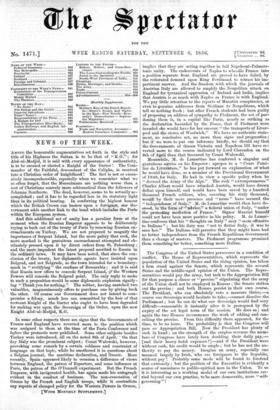In some other respects there are signs that the Governments
of France and England have reverted more to the position which was assigned to them at the time of the Paris Conference and before the protocols were published. Some other subjeCts besides Turkey were introduced, all on the noted 8th of April:—On that -day Italy was the prominent subject ; Count Walewski, however, provoking some remark by a certain coldness and constraint of language on that topic, while he smothered it in questions about a Belgian journal, the maritime declaration, and Greede. More recently, Spain--appeared likely to occasion a difference of views between England, the patron of Espartero, and some influence at Paris, the patron of the O'Donnell experiment. But the French Emperor, with invigorated health, has again made his autograph evident in the conduct of business. The non-evacuation of Greece by the French and English troops, while it contradicts any reports of changed policy for the Western Powers in Greece, implies that they are acting together in full Napoleoni-Pahners- tonic unity. The endeavours of Naples to wheedle France into a position separate from England are proved to have failed, by the reiterated demand upon King Ferdinand to retract his im- pertinent answer. And the freedom with which the journals of Austrian Italy are allowed to amplify the Neapolitan attack on England-for tyrannical oppression of Ireland and India, implies that Austria is as much with Naples as France is with England: We pay little attention to the reports of Muratist conspiracies, or even to -genuine addresses from Sicilians to Neapolitans, which tell us nothing fresh ; but after French students had been guilty of proposing an address of sympathy to Piedmont, the act of par- doning them is, in a capital like Paris, nearly as striking as the declaration hazarded by the Times, that if Piedmont were invaded she would have for her succour " the transports of Liver- pool and the stores of Woolwich." We have no authentic state- ment, no conclusive act, no more than signs and prognostics ; but if. we were to put our inference briefly, we should say that the Governments of Queen Victoria and Napoleon III have re- verted- more to the course indicated by Lord Clarendon on the 8th or April than that favoured by Count Walewski. ,Meanwhile, M. de Lamartine has conferred a singular and gratuitous service on his Emperor : apropos to a " Cours Fami- liar de Litterature," .he has put forward an explanation of what he would have done, as a member of the Provisional Government of 1848, for Italy. He had in view a specific policy when he " decreed the Army of the Alps." The rash " extemporaneous " Charles Albert would have- attacked Austria, would have drawn defeat upon himself, and would have been saved. by a hundred thousand French soldiers, who, covering his sixty thousand, would- by their mere presence and " name " have secured the " independence, of Italy,!: .11.-de-Lamartine would then have de- creed, in 'the 'form 'of.-'''ItavIce,i? a 'federal union of Italy, " under the protecting inecliation of. France." Signor Mazzini hiniself could not have been more positive in his policy. M. de Lamar- tine confesses that his " thoughts on Italy" may "seem offensive to Italians " ; but his duty was " not to flatter Italy, it was to save her." The Italians will perceive that they might have had no better independence from the French Republican Government than a change of masters. The Piedmont programme promised them something far better, something more Italian.


































